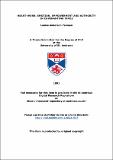Files in this item
Heart-work: emotion, empowerment and authority in covenanting times
Item metadata
| dc.contributor.advisor | Smout, T. C. (T. Christopher) | |
| dc.contributor.advisor | Stevenson, David | |
| dc.contributor.author | Yeoman, Louise Anderson | |
| dc.coverage.spatial | xiv, 287 p. | en |
| dc.date.accessioned | 2009-01-26T10:54:55Z | |
| dc.date.available | 2009-01-26T10:54:55Z | |
| dc.date.issued | 1991 | |
| dc.identifier.uri | https://hdl.handle.net/10023/637 | |
| dc.description.abstract | 'Heart-work' is an examination of the inner world of the covenanters; particularly with regard to authority, empowerment and affective experience. It examines the covenanting phenomenon of conversion, which placed believers in touch with a comforting, empowering and guiding inner sense. It explores the manifestations of this inner sense, and also considers the covenanting attitudes to reason, emotion and feeling which were influenced by the centrality of this spiritual inner sense in covenanting devotion. There has also been a study of its effects on both theories of authority and practical behaviour. Both the public political climate of declarations and polemic, and the personal spiritual arena of diaries, letters and autobiographies have been explored. Modes of worship and attitudes to ceremonies are covered, as is the response of normally disadvantaged groups such as women and the lower classes to covenanting Calvinism. Modern psychotherapy theory has been used in some cases to explain why certain processes and doctrines had certain effects. In conclusion, it seems that Scottish presbyterianism relied for its effects on breaking through to a deeper level of spiritual experience in its adherents. This experience, which was connected to feeling rather than reason, was open to all persons. It was connected with the doctrines of the 'mystical body of Christ' and of the covenant by which Christ's total sovereignty within and without was recognised. Those who experienced it were profoundly affected by it and often found themselves empowered to stand up to their social superiors as a result. This inner spiritual experience was the motive force behind covenanting practice, and efforts to foster and preserve it, led to clashes with the episcopalian royal establishment, since the experience itself was closely linked to a certain framework of devotions which its adherents would not suffer to see tampered with. | en |
| dc.format.extent | 15703113 bytes | |
| dc.format.mimetype | application/pdf | |
| dc.language.iso | en | en |
| dc.publisher | University of St Andrews | |
| dc.subject.lcc | BX9081.Y3 | |
| dc.title | Heart-work: emotion, empowerment and authority in covenanting times | en |
| dc.type | Thesis | en |
| dc.type.qualificationlevel | Doctoral | en |
| dc.type.qualificationname | PhD Doctor of Philosophy | en |
| dc.publisher.institution | The University of St Andrews | en |
This item appears in the following Collection(s)
Items in the St Andrews Research Repository are protected by copyright, with all rights reserved, unless otherwise indicated.

